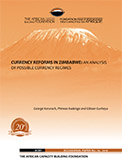
The Government of Zimbabwe (GoZ) adopted a multiple currencies regime (MCR) in February 2009 and demonetized the Zimbabwean dollar in July 2009 after almost a decade of economic crisis. The MCR strategy resulted in stabilizing the Zimbabwean economy; however, there are remaining concerns that need to be addressed. The purpose of this paper is to explore various options of currency regimes that could be adopted in the short and medium term in order to consolidate Economic stabilization and recovery in Zimbabwe. The paper proposes that the optimal choice of a particular currency regime be based on a framework that takes into account the following: (a) the advantages and disadvantages of a particular regime, (b) the need for correct timing and sequencing of policy tools and reform actions, (c) the prior capacity conditions in the country, and (d) the political commitment to undertake the necessary reforms. It is imperative to note that these reforms are no quick fixes for designing economic stabilization and recovery programs needed in Zimbabwe. The Zimbabwean authorities and stakeholders need to fulfill the aforesaid preconditions for successful currency reform, before collectively selecting from among the various options.





